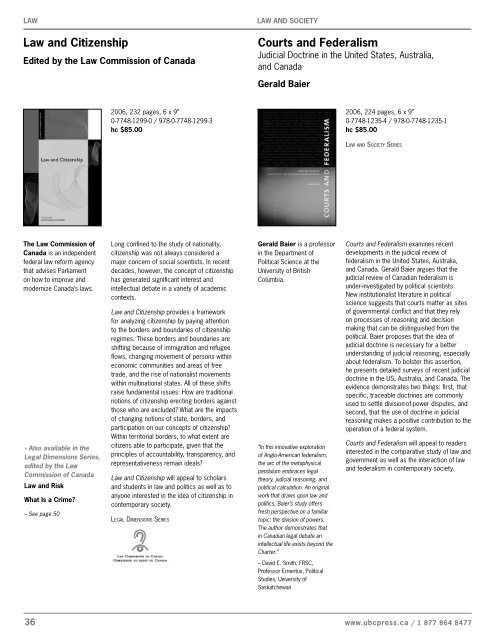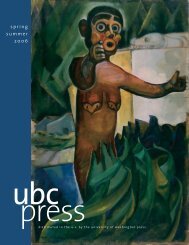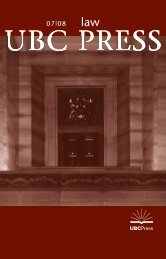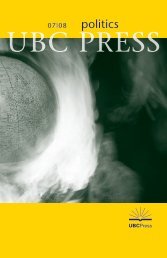The Future of Canada's Water - UBC Press
The Future of Canada's Water - UBC Press
The Future of Canada's Water - UBC Press
Create successful ePaper yourself
Turn your PDF publications into a flip-book with our unique Google optimized e-Paper software.
LAW<br />
Law and Citizenship<br />
Edited by the Law Commission <strong>of</strong> Canada<br />
LAW AND SOCIETY<br />
Courts and Federalism<br />
Judicial Doctrine in the United States, Australia,<br />
and Canada<br />
Gerald Baier<br />
2006, 232 pages, 6 x 9”<br />
0-7748-1299-0 / 978-0-7748-1299-3<br />
hc $85.00<br />
2006, 224 pages, 6 x 9”<br />
0-7748-1235-4 / 978-0-7748-1235-1<br />
hc $85.00<br />
LAW AND SOCIETY SERIES<br />
<strong>The</strong> Law Commission <strong>of</strong><br />
Canada is an independent<br />
federal law reform agency<br />
that advises Parliament<br />
on how to improve and<br />
modernize Canada’s laws.<br />
» Also available in the<br />
Legal Dimensions Series,<br />
edited by the Law<br />
Commission <strong>of</strong> Canada<br />
Law and Risk<br />
What Is a Crime?<br />
– See page 50<br />
Long confined to the study <strong>of</strong> nationality,<br />
citizenship was not always considered a<br />
major concern <strong>of</strong> social scientists. In recent<br />
decades, however, the concept <strong>of</strong> citizenship<br />
has generated significant interest and<br />
intellectual debate in a variety <strong>of</strong> academic<br />
contexts.<br />
Law and Citizenship provides a framework<br />
for analyzing citizenship by paying attention<br />
to the borders and boundaries <strong>of</strong> citizenship<br />
regimes. <strong>The</strong>se borders and boundaries are<br />
shifting because <strong>of</strong> immigration and refugee<br />
flows, changing movement <strong>of</strong> persons within<br />
economic communities and areas <strong>of</strong> free<br />
trade, and the rise <strong>of</strong> nationalist movements<br />
within multinational states. All <strong>of</strong> these shifts<br />
raise fundamental issues: How are traditional<br />
notions <strong>of</strong> citizenship erecting borders against<br />
those who are excluded? What are the impacts<br />
<strong>of</strong> changing notions <strong>of</strong> state, borders, and<br />
participation on our concepts <strong>of</strong> citizenship?<br />
Within territorial borders, to what extent are<br />
citizens able to participate, given that the<br />
principles <strong>of</strong> accountability, transparency, and<br />
representativeness remain ideals?<br />
Law and Citizenship will appeal to scholars<br />
and students in law and politics as well as to<br />
anyone interested in the idea <strong>of</strong> citizenship in<br />
contemporary society.<br />
LEGAL DIMENSIONS SERIES<br />
Gerald Baier is a pr<strong>of</strong>essor<br />
in the Department <strong>of</strong><br />
Political Science at the<br />
University <strong>of</strong> British<br />
Columbia.<br />
“In this innovative exploration<br />
<strong>of</strong> Anglo-American federalism,<br />
the arc <strong>of</strong> the metaphysical<br />
pendulum embraces legal<br />
theory, judicial reasoning, and<br />
political calculation. An original<br />
work that draws upon law and<br />
politics, Baier’s study <strong>of</strong>fers<br />
fresh perspective on a familiar<br />
topic: the division <strong>of</strong> powers.<br />
<strong>The</strong> author demonstrates that<br />
in Canadian legal debate an<br />
intellectual life exists beyond the<br />
Charter.”<br />
Courts and Federalism examines recent<br />
developments in the judicial review <strong>of</strong><br />
federalism in the United States, Australia,<br />
and Canada. Gerald Baier argues that the<br />
judicial review <strong>of</strong> Canadian federalism is<br />
under-investigated by political scientists.<br />
New institutionalist literature in political<br />
science suggests that courts matter as sites<br />
<strong>of</strong> governmental conflict and that they rely<br />
on processes <strong>of</strong> reasoning and decision<br />
making that can be distinguished from the<br />
political. Baier proposes that the idea <strong>of</strong><br />
judicial doctrine is necessary for a better<br />
understanding <strong>of</strong> judicial reasoning, especially<br />
about federalism. To bolster this assertion,<br />
he presents detailed surveys <strong>of</strong> recent judicial<br />
doctrine in the US, Australia, and Canada. <strong>The</strong><br />
evidence demonstrates two things: first, that<br />
specific, traceable doctrines are commonly<br />
used to settle division-<strong>of</strong>-power disputes, and<br />
second, that the use <strong>of</strong> doctrine in judicial<br />
reasoning makes a positive contribution to the<br />
operation <strong>of</strong> a federal system.<br />
Courts and Federalism will appeal to readers<br />
interested in the comparative study <strong>of</strong> law and<br />
government as well as the interaction <strong>of</strong> law<br />
and federalism in contemporary society.<br />
– David E. Smith, FRSC,<br />
Pr<strong>of</strong>essor Emeritus, Political<br />
Studies, University <strong>of</strong><br />
Saskatchewan<br />
36<br />
www.ubcpress.ca / 1 877 864 8477













